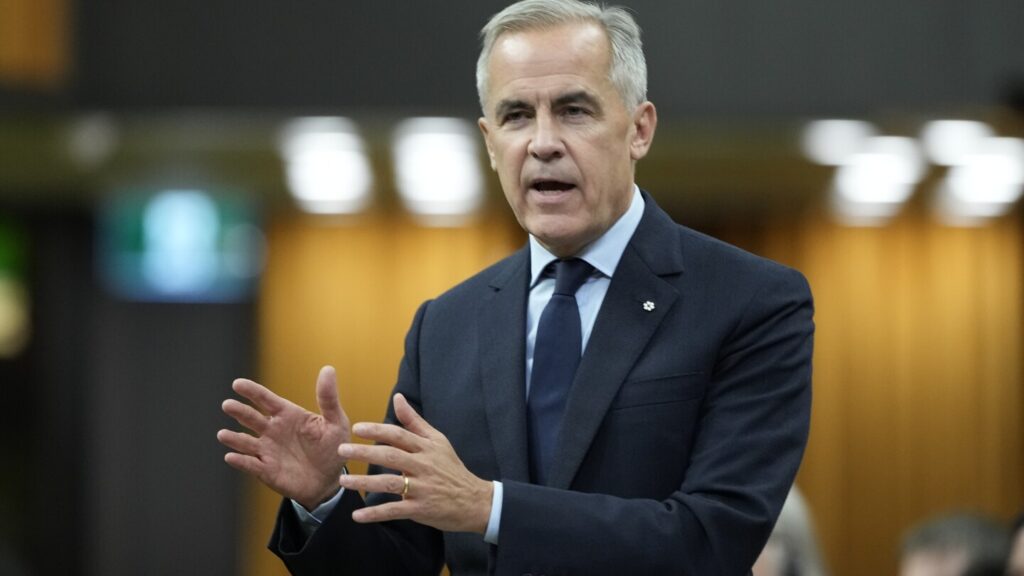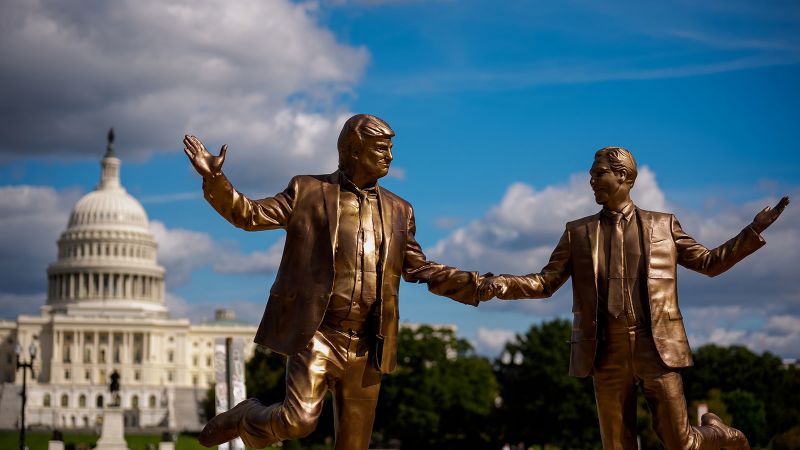He has been making a recovery and has been in stable condition since.The family shared the letter from the President.”Melania and I are devastated to learn of your injury. Please know that my Administration will never stop fighting to clean up our streets and ensure law and order,” Trump wrote in the letter shared on social media.”Your courage reflects the power of the human spirit, and your tenacity is an inspiration to so many. We hope you find comfort in the love of family and friends and that you will be uplifted by the abiding strength and support of all those around you.”Our thoughts and prayers will remain with you and your entire family.
The meeting comes ahead of a review of a free trade agreement and as Trump is engaging in 51st state talk again as Canada asks to be included in Trump’s future Golden Dome missile defense program.In a statement, Carney’s office said the prime minister will travel to Washington on Monday before meeting Trump in the Oval Office on Tuesday. Carney won Canada’s election earlier this year fueled by Trump’s annexation threats and trade war, but he has tried to improve relations ahead of a review of the free trade deal next year.More than 75% of Canada’s exports go to the U.S. and Canada recently dropped many of its retaliatory tariffs to match U.S.
Sean Combs to be sentencedSean “Diddy” Combs will appear before a federal judge in Manhattan on Friday to be sentenced following his conviction earlier this year on federal prostitution-related charges.Following the eight-week trial concluded in July, jurors cleared Combs of the most serious accusations; sex trafficking and racketeering conspiracy. The jury did, however, convict him on two charges of transporting people for prostitution. Judge Arun Subramanian now holds the task of deciding the penalty.
White House halts $2.1bn of Chicago infrastructure fundingThe federal government put $2.1bn earmarked for Chicago infrastructure projects on hold, Office and Management and Budget Director Russ Vought said on Friday, in another jab at a Democrat-led city during the US government shutdown.Vought wrote on X that projects affected included the Red Line extension – which was set to break ground next year and extend public transport to underserved areas in the city – as well as modernization work to a number of transit lines.Vought wrote on social media Friday that the money was “put on hold to ensure funding is not flowing via race-based contracting.”He made a similar announcement earlier this week involving New York, where Vought said $18 million for infrastructure would be paused, including funding for a new rail tunnel under the Hudson River.Key eventsShow key events onlyPlease turn on JavaScript to use this featureDOT cites ‘race-based contracting’ as reason for freezing $2bn of Chicago infrastructure fundingIn Russell Vought’s announcement that the White House is halting $2bn in funding for infrastructure projects for Chicago, he said the move was “to ensure funding is not flowing via race-based contracting”.If follows a similar announcement earlier this week involving New York City, where Vought said $18m for infrastructure would be frozen, including funding for a new rail tunnel under the Hudson River, due to the Trump administration’s belief that the money was “based on unconstitutional DEI [diversity, equity and inclusion] principles”.Now a statement from the US transportation department echoes the sentiment, declaring a “review of Chicago’s discriminatory, unconstitutional processes”. Through an interim final rule issued this week, it notes that DOT is removing the use of the race- and sex-based presumptions of social and economic disadvantage in contracting requirements for federal grants.“Illinois, like New York, is well known to promote race- and sex-based contracting and other racial preferences as a public policy,” the statement reads. It refers to the Chicago Transit Authority’s spending on DBE (Disadvantaged Business Enterprise) firms (where at least 51% of the business is owned and controlled by one or more socially and economically disadvantaged individuals) as “discriminatory, illegal and wasteful contracting practices”.“The American people don’t care what race or gender construction workers, pipefitters , or electricians are,” the statement from the government department adds.It marks the latest instance since the government shutdown began at midnight on Wednesday of the White House punishing Democrats by withholding money for projects in blue states and cities.On the same day as the move targeting NYC, the energy department cancelled almost $8bn in funding for projects in 16 states won by Kamala Harris in the 2024 election.The Eisenhower Presidential Library’s director has exited his position after advocating against giving a sword from the collection to King Charles as a gift during Donald Trump’s recent state visit, according to US media reports on Thursday.Todd Arrington left his post on Monday after being told to “resign or be fired”, he told CBS News, which did not specify who had relayed the message to the historian.The library and museum – located in former US president Dwight D Eisenhower’s home town in Abilene, Kansas – is part of the National Archives and Records Administration (Nara).White House halts $2.1bn of Chicago infrastructure fundingThe federal government put $2.1bn earmarked for Chicago infrastructure projects on hold, Office and Management and Budget Director Russ Vought said on Friday, in another jab at a Democrat-led city during the US government shutdown.Vought wrote on X that projects affected included the Red Line extension – which was set to break ground next year and extend public transport to underserved areas in the city – as well as modernization work to a number of transit lines.Vought wrote on social media Friday that the money was “put on hold to ensure funding is not flowing via race-based contracting.”He made a similar announcement earlier this week involving New York, where Vought said $18 million for infrastructure would be paused, including funding for a new rail tunnel under the Hudson River.Good morning and welcome to our live coverage of US politics, with the shutdown entering its third day.Although the Senate is scheduled to return today for another vote, there is little optimism that a deal is imminent as Democrats hold out for a series of health-focused concessions.Meanwhile, the White House has continued to use its official, taxpayer-funded social media accounts to insult and mock Democrats, treating the standoff more like a political campaign than a negotiation over policy.In addition, a growing number of federal agencies and staff are explicitly blaming Democrats for the shutdown.
A statue of President Donald Trump and sex offender Jeffrey Epstein holding hands has returned to the National Mall after it was removed by the National Park Service last week. Called “Best Friends Forever,” the statue shows Trump and Epstein each with a foot kicked back and a hand flailing into the air, as well as a plaque between the pair titled “In Honor of Friendship Month” that reads: “We celebrate the long-lasting bond between President Donald J. Trump and his ‘closest friend,’ Jeffrey Epstein.” Trump has denied having had a close relationship with Epstein, and has dismissed the controversies surrounding their ties as a “Democratic hoax.” The statue was put back together by the organization responsible for it, “The Secret Handshake.” It had been dismantled and severely damaged after its ordered removal last week, and there are still visible marks of the damage.
President Donald Trump’s budget director announced $2.1 billion in federal infrastructure money for Chicago is being paused as the administration continues to target money for blue cities and states amid the government shutdown.White House Office of Management and Budget Director Russell Vought said the frozen dollars had been allocated to support improvements to Chicago Transit Authority rail lines.Vought earlier announced that $18 billion in infrastructure funds for New York, the home state of Democratic congressional leaders Hakeem Jeffries and Chuck Schumer, had been put on hold and $8 billion in Department of Energy projects in 16 blue states was cut.Democrats have complained about the funding cuts.”We’re less than a day into this shutdown, and Trump & Vought are illegally punishing Democrat-led states,” Sen. Patty Murray, D-Washington, said on social media, calling the moves “mafioso tactics.”Trump has talked about cutting “Democrat things” during the shutdown. The president said on social media Oct.


